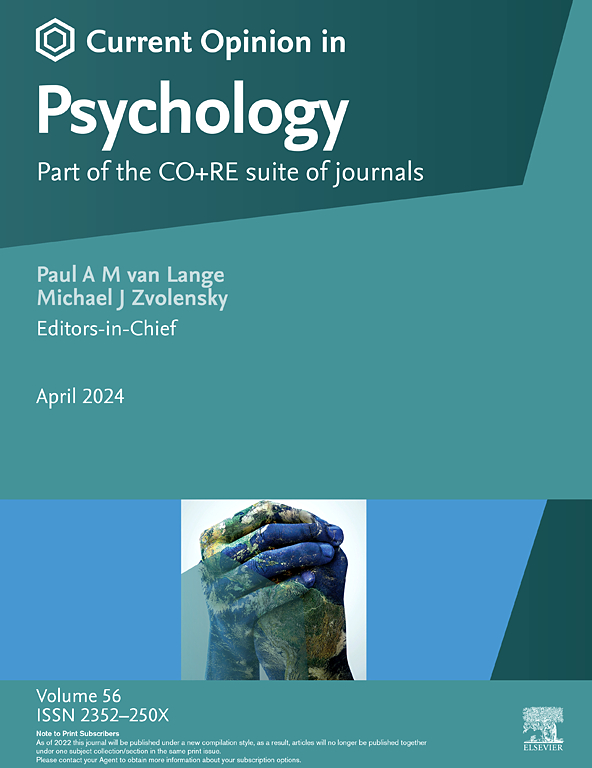故意拒绝心理和行为干预
IF 6.9
2区 心理学
Q1 PSYCHOLOGY, MULTIDISCIPLINARY
引用次数: 0
摘要
心理学和行为科学在制定、测试和实施旨在应对社会挑战(包括虚假信息、两极分化和心理健康)的干预措施方面发挥着关键作用。一些干预措施在形成政策决定方面产生了影响,但它们在现实世界的成功实施受到挑战的困扰,包括许多可能从干预措施中受益的人选择忽视它。然而,几乎没有关于人们为什么会故意拒绝参与干预的研究:他们注意到它,考虑参与,然后决定不参与。解决这一知识差距对于提高干预措施的接受程度至关重要。借鉴故意无知的文献,我们提出了一个故意拒绝心理和行为干预的贝叶斯模型。人们对干预措施的相关性、有效性以及干预措施来源的目标和可靠性的先验信念,强烈地影响了人们在遇到干预措施时故意拒绝干预措施的可能性。基于该模型,我们认为,如果人们认为干预本身无效,他们可能会降低干预来源的可靠性,而使用具有高感知可靠性的干预来源是优化干预吸收的关键。本文章由计算机程序翻译,如有差异,请以英文原文为准。
The wilful rejection of psychological and behavioural interventions
Psychology and behavioural science play a key role in the development, testing, and implementation of interventions aimed at addressing societal challenges. Some of these interventions have been impactful in shaping policy decisions, but their successful real-world implementation is beset by challenges, including a large number of people who might benefit from an intervention choosing to ignore it. However, there is almost no research on why people wilfully reject participating in an intervention: they notice it, consider participation, and decide against it. Addressing this knowledge gap is of critical importance for improving intervention uptake. Drawing on the literature on wilful ignorance, we propose a Bayesian model of the wilful rejection of psychological and behavioural interventions. People's prior beliefs about the relevance of an intervention, its effectiveness, and the goals and reliability of the intervention's source, strongly inform the probability of people wilfully rejecting an intervention when they come across it. Based on this model, we argue that people may downgrade their perceptions of the source's reliability if they perceive the intervention itself to be inefficacious, and that using intervention sources with high perceived reliability among target audiences is key to optimising intervention uptake.
求助全文
通过发布文献求助,成功后即可免费获取论文全文。
去求助
来源期刊

Current Opinion in Psychology
PSYCHOLOGY, MULTIDISCIPLINARY-
CiteScore
12.10
自引率
3.40%
发文量
293
审稿时长
53 days
期刊介绍:
Current Opinion in Psychology is part of the Current Opinion and Research (CO+RE) suite of journals and is a companion to the primary research, open access journal, Current Research in Ecological and Social Psychology. CO+RE journals leverage the Current Opinion legacy of editorial excellence, high-impact, and global reach to ensure they are a widely-read resource that is integral to scientists' workflows.
Current Opinion in Psychology is divided into themed sections, some of which may be reviewed on an annual basis if appropriate. The amount of space devoted to each section is related to its importance. The topics covered will include:
* Biological psychology
* Clinical psychology
* Cognitive psychology
* Community psychology
* Comparative psychology
* Developmental psychology
* Educational psychology
* Environmental psychology
* Evolutionary psychology
* Health psychology
* Neuropsychology
* Personality psychology
* Social psychology
 求助内容:
求助内容: 应助结果提醒方式:
应助结果提醒方式:


